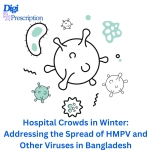
Hospital Crowds in Winter: Addressing the Spread of HMPV and Other Viruses in Bangladesh
As winter approaches, hospitals across Bangladesh face a surge in patients, particularly those suffering from respiratory illnesses. Among the most concerning are infections caused by Human Metapneumovirus (HMPV), Influenza, RSV, and other seasonal viruses. Overcrowding in hospitals not only overwhelms healthcare workers but also increases the risk of virus transmission.
This article explores why winter brings an influx of patients to hospitals, how hospital crowding exacerbates the spread of viruses, and actionable solutions to minimize risks.
Why Are Hospitals Overcrowded in Winter?
-
Increased Respiratory Illnesses:
During winter, viruses like HMPV, RSV, and the flu thrive in colder temperatures. Children, the elderly, and people with chronic conditions are especially vulnerable. -
Poor Air Quality:
Winter air pollution in Bangladesh, caused by brick kilns, vehicle emissions, and biomass burning, exacerbates asthma, COPD, and other respiratory conditions. -
Limited Access to Primary Care:
Many rural areas lack access to primary healthcare, forcing patients to visit overcrowded urban hospitals for treatment. -
Seasonal Allergies:
Winter allergens, such as dust mites and mold, worsen symptoms in individuals with pre-existing respiratory conditions. -
Spread of Infectious Diseases:
Crowded waiting rooms and inpatient wards make hospitals breeding grounds for the spread of highly contagious viruses like HMPV.
What is HMPV and Why Is It a Concern in Bangladesh?
Human Metapneumovirus (HMPV) is a respiratory virus that causes symptoms similar to the common cold but can lead to severe complications like pneumonia and bronchitis, particularly in young children, older adults, and immunocompromised individuals.
- Transmission: HMPV spreads through respiratory droplets, direct contact, and contaminated surfaces, making crowded hospital settings a high-risk environment.
- Symptoms: Fever, cough, nasal congestion, wheezing, and difficulty breathing. Severe cases may require hospitalization.
Impact of Hospital Crowding on Virus Transmission
1. Increased Cross-Contamination:
Patients in close quarters are more likely to be exposed to viruses circulating in the hospital. Inadequate ventilation exacerbates the problem.
2. Strain on Healthcare Workers:
Overworked medical staff may find it challenging to maintain strict infection control measures, such as hand hygiene and isolation protocols.
3. Limited Isolation Facilities:
Many hospitals in Bangladesh lack adequate isolation wards, leading to the mixing of patients with infectious diseases and others seeking treatment.
Addressing the Spread of Viruses in Overcrowded Hospitals
1. Strengthening Infection Control Measures
- Regularly sanitize high-touch surfaces like door handles, bed rails, and waiting room chairs.
- Use personal protective equipment (PPE) such as masks and gloves for healthcare workers and visitors.
- Isolate patients with confirmed or suspected viral infections.
2. Expanding Telemedicine Services
- Encourage patients with mild symptoms to use online consultations, reducing the number of people visiting hospitals unnecessarily.
- Platforms like Digi Prescription enable doctors to manage patients remotely, reducing hospital visits.
3. Community Healthcare Centers
- Establish temporary healthcare centers in rural areas during peak seasons to handle non-critical cases.
- Train local healthcare workers to provide basic treatments and manage respiratory illnesses.
4. Promote Vaccination Campaigns
- Increase public awareness of flu vaccines and other preventive measures, particularly for children, the elderly, and people with chronic conditions.
5. Improve Ventilation Systems in Hospitals
- Install air purifiers and maintain proper ventilation to reduce the concentration of airborne viruses in enclosed spaces.
How to Protect Yourself and Your Family from HMPV and Other Viruses
- Practice Good Hygiene: Wash your hands frequently with soap and water, especially after touching shared surfaces.
- Wear Masks: Use masks in crowded public spaces and healthcare settings.
- Get Vaccinated: While there is no vaccine for HMPV yet, flu and pneumonia vaccines can reduce your risk of severe complications.
- Avoid Crowded Hospitals: Use online consultation platforms for minor illnesses to avoid unnecessary exposure.
- Boost Immunity: Eat a balanced diet rich in vitamins, exercise regularly, and stay hydrated.
Efforts in Bangladesh to Address the Issue
Organizations like the Directorate General of Health Services (DGHS) and international bodies such as WHO and UNICEF are working to:
- Promote awareness of respiratory illnesses.
- Train healthcare workers on infection control.
- Expand telemedicine initiatives for rural and underserved areas.
- Improve vaccination coverage among vulnerable populations.
Conclusion
Winter hospital crowds in Bangladesh are a recurring challenge, but with better infection control, expanded healthcare access, and public awareness, the risks of spreading viruses like HMPV can be minimized. Utilizing digital healthcare tools and telemedicine can play a significant role in reducing hospital visits, ensuring timely care, and protecting vulnerable populations.
Reliable Sources of Information
- World Health Organization (WHO): Visit WHO
- Centers for Disease Control and Prevention (CDC): Visit CDC
- Directorate General of Health Services (DGHS), Bangladesh: Visit DGHS
- icddr,b: Visit icddr,b
